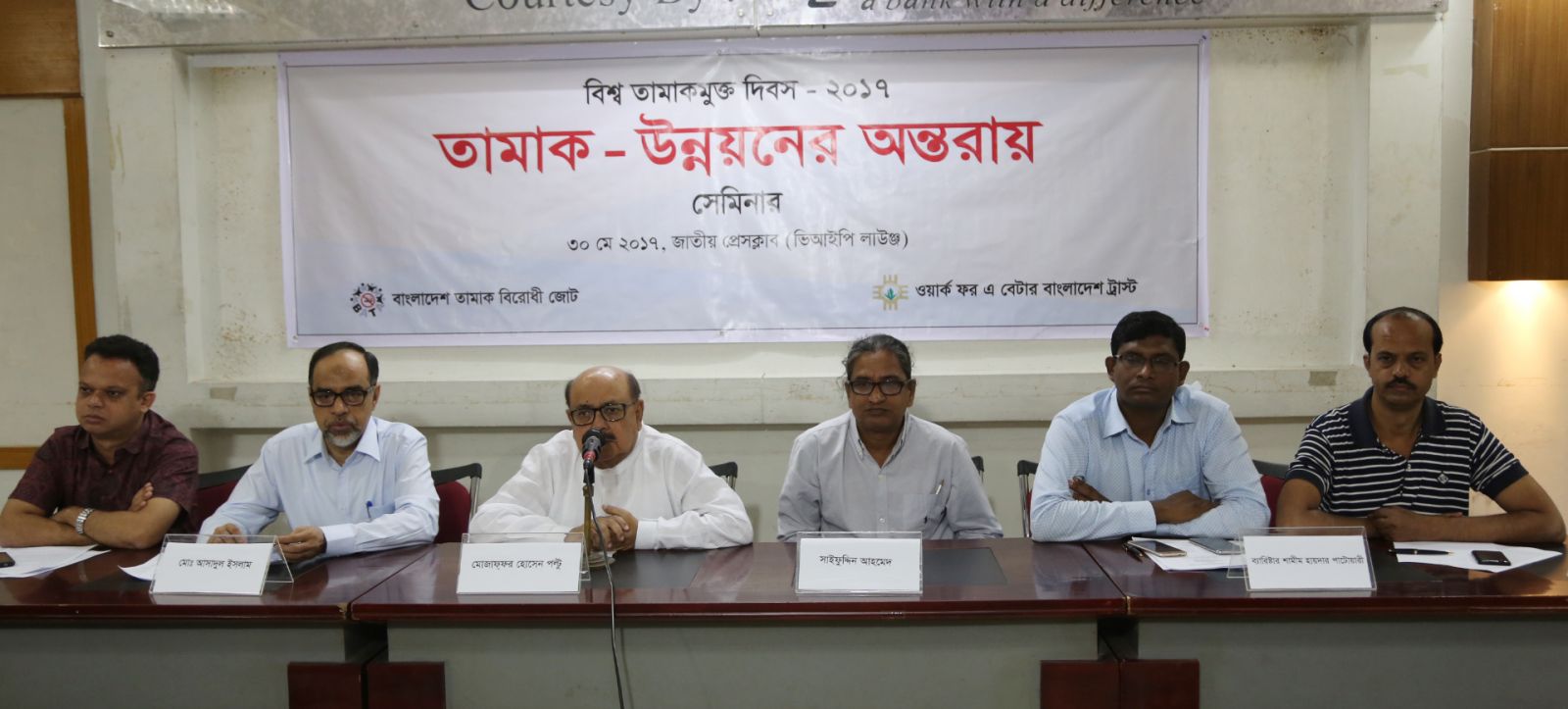
The government gets a lot of money from tobacco sector. But, more money is spent on the treatment of tobacco-related diseases. Due to tobacco use, non-communicable diseases (NCDs), including heart disease, stroke, lung cancer, oral cancer, diabetes, COPD and many other diseases are increasing. These diseases are lethal, expensive and long-term. About 1.2 million people are suffering from these diseases that have negative impact in the national economy. Political commitment is extremely urgent for effective tobacco control. Tobacco Industries are influencing government policy due to government shares at the British American Tobacco Bangladesh (BATB) and senior government officials represents to the board of directors of the BATB. So it is also necessary withdraw government shares from tobacco industries.
On 30 May 2017, Speakers demand the above in the seminar organized at the National Press Club's VIP Lounge on the occasion of World No Tobacco Day 2017. This seminar jointly organized by Work for a Better Bangladesh (WBB) Trust and Bangladesh Anti-Tobacco Alliance (BATA). Speakers also said that, government should not be a partner in such products business that leads to the death of 100,000 people in the country.
Seminar chaired by Mozaffar Hossain Poltu, President of National Anti-Tuberculosis Association of Bangladesh (NATAB) and Advisor of Bangladesh Anti-Tobacco Alliance (BATA). While Md. Ashadul Islam, Director General of Health Economics Unit of Ministry of Health and Family Welfare; Saifuddin Ahmed, Executive Director of WBB Trust; Helal Ahmed, Secretary General of Prottasha Anti-Drug Club; Barrister Shameem Haider Patwary, Vice-president of Board of Trustee of Dhaka International University and President of Tobacco Control Research Cell (TCRC) spoke. In the seminar, key note speech given by Syed Mahbubul Alam, Technical Advisor of The Union and moderated by Aminul Islam Sujon, Executive Editor of BATA newsletter ‘Samaswar’.
Speakers said, ‘Tobacco is a threat to development. Tobacco cultivation, drying of tobacco leaf in firewood furnace, production of tobacco products like bidi, cigarette, jarda, gul, and tobacco consumption - at all stages tobacco is harming public health, environment, and economy. The United Nations includes the implementation of the International treaty Framework Convention on Tobacco Control (FCTC) and reduction of NCDs one third in the sustainable development targets (SDGs) to control the multidimensional damage to tobacco. Tobacco control is necessary not only to achieve the health related target but others also; like poverty reduction, ensuring food safety and agriculture, climate change, employment, gender equity etc. The government is very sincere in controlling tobacco. But Tobacco industries are intruding tobacco control activities in many ways. As govt. have shares in BATB and as the senior government officials represents to BATBs board of directors for various personal benefits, they affects the government's tobacco control activities. So, it is necessary to withdraw these shares.
They also said, ‘The tendency of smokeless is more among the women. Due to smoking and passive smoking among pregnant women, dead childbirth, harm of unborn baby and physical disabilities are happening; which is a great challenge for overall development. For this reason, smokeless tobacco is not to be excluded from Tobacco Control Program’
Syyeda Akhter, coordinator of TABINAJ, Zebunnessa, Executive Director of HEEL, Tushar Chandan from Shamprety Poribar participated in the open discussion.

